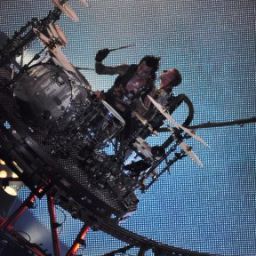by Keidra Chaney
Over the Thanksgiving holiday, the band Mastodon sold a Thanksgiving-themed shirt on their website. Here’s the shirt:

I gasped aloud when I saw it. Racism, misogyny, and full-on douchebaggery all rolled up into one stunningly ignorant, offensive shirt. I’m not a Mastodon fan, but I have liked enough of their stuff in the past. They have this reputation of being a “thinking man’s metal band,” especially among people who are casually into metal, and I just went on the assumption that they were smarter than a shirt like this. I am also not that surprised to learn that I am wrong. The counter-argument about the T-shirt is that it was a very clumsily executed statement on colonialism. I am not buying it. (Also, I don’t care, I still found it tacky and offensive.)
Some of the fan response on their Facebook page was so ignorant and offensive I don’t even want to call attention to it. A fan of Mastodon who is also an indigenous woman wrote a passionate response that you can read here. A friend of mine who is a big Mastodon fan and a person of color responded with a great level of disappointment that I have a lot of empathy for. If it was a band I loved, I’d feel equally betrayed.
When you talk about the dovetailing of fandom and identity, metal fans are a prime example of that: the sense of community is as much a part of the life as the music itself. That’s why to be a person of color (or a woman, or LGBT) and be a fan of metal, hardcore, or extreme music means to a certain extent you are putting your heart on the line. It’s the heartbreak of being a part of a music community of outsiders that is super welcoming and enthusiastic when you’re sincerely into the music, but will sometimes slap you in the face at any moment with that underlying reminder “hey, we REALLY don’t think you belong here.” Sometimes at the points where you most feel like you belong.
Someone online once made a joke about that WOMP feeling of casually listening to some random hardcore band, getting into the music and then realizing as soon as they start singing that they’re racist. For those fans of Mastodon that feel betrayed by the shirt that WOMP feeling comes years after the fact, years after buying albums, going to shows, probably arguing with friends that don’t like them. Years of going ride-or-die and feeling that intense emotional connection to a band’s music that frankly is the very best thing about being a fan, all down the drain. So yeah, that really sucks.
And of course, to mention this, to bring it up in mixed company, is to “distract” from the music. I wrote in an essay for Bitch Magazine years ago about reconciling my multiple identities as a black woman and a metal fan, and I can’t say that it has gotten any easier. I don’t think it can: not when just metal, but rock music in general – the culture, the industry, the fandom – is so folded to a presumed white male identity it can’t ever really just be about the music itself. The very act of connecting emotionally to the music is a negotiation: “Hey can I like this band and go to their show knowing I won’t get my ass kicked?” You can enjoy the music for what it is, knowing that in order to be accepted a part of one community it potentially compromises your identity in other ways.
But that’s not a concern for everyone. There are people of color who are big into Burzum. I’ve had similar conversations with people, not just about music: at what point can/do/should you separate the creative merit of an individual (or a band) from their reprehensible personality or odious opinions? Everyone’s mileage varies, it seems. I know for one I sure as hell will not give my money to an individual or group that does not see me or people like me as a human being. But I also draw the line at those musicians who seem to find childish amusement in racist iconography (looking at you, Iceage) or shock racism, misogyny, homophobia, etc. And I know people who are willing to work around that line if they really admire a band/musician artistically. I find that difficult to do.
Being a woman of color into this music means that continuing negotiation of identities which has always been a part of my personal relationship with metal, the music and the fan community, and why I both identify with it while keeping it at arm’s length. Times like this I am sadly reminded how much that has not changed.



[…] Being a Person of Color and a Metal Fan Sometimes Means Risking Heartbreak […]